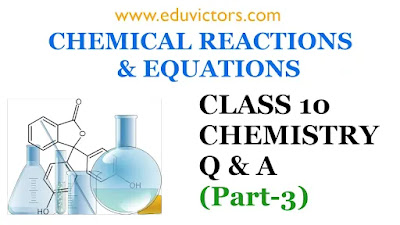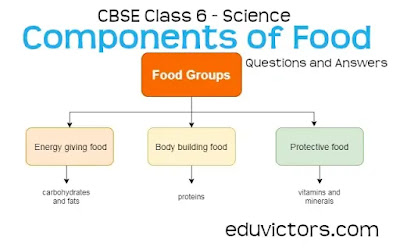Chapter - Psychology and Sports- Personality Types (Questions and Answers)
CBSE Class 12 - Physical Education
Blog provides NCERT solutions, CBSE, NTSE, Olympiad study material, model test papers, important Questions and Answers asked in CBSE examinations. References to Educational Sites and resources.
CBSE Class 12 - Physical Education

The first chapter of Chemistry talks about chemical reactions and equations. In a chemical reaction, reactants are transformed into products. In this series, the part-3 video discusses types of chemical reactions.
Following questions are covered:
Q1: What are the important types of chemical reactions.
Q2: What are combination reactions? Give examples.
Q3: Hydrogen burns in oxygen to form water. Identify the type of reaction.

Fill in the blanks with suitable words
1. _________ and _________ fibres are obtained from animals.
2. The famous Pashmina shawls come from the soft under-fur of the ________ goat.
3. Silk fibres come from _________ of silk _________.
4. Liama and Alpaca also yield_____________ and are found in_____________.

1-Mark Questions
Chapters: Introduction to Trigonometry, Applications of Trigonometry, Statistics, Probability


Chapters covered: Real Numbers, Polynomials, Arithmetic progressions, Co-ordinate Geometry, Introduction to Trigonometry
1-Mark based Questions (with Answers)
Q1: What is the HCF of the smallest composite number and the smallest prime number?
Answer: Smallest composite number = 4
Smallest prime number = 2
HCF (4, 2) = 2
Q2: If HCF of a and b is 12 and product of these numbers is 1800. What is the LCM of these numbers?
Answer: a × b = HCF × LCM
⇒ 1800 = 12 × LCM
⇒ LCM = 1800 / 12 = 150

CBSE Class 10 - History
Directions: Read the questions carefully and pick up the correct choice.
Q1: Which of the following is true with reference of Satyagraha?
(Ⅰ) It emphasized muscle power
(Ⅱ) It emphasized the power of truth
(Ⅲ) Gandhiji successfully fought the racist regime of South Africa with the novel method.
(a) Only Ⅰ is true
(b) Only Ⅱ is true
(c) Both Ⅰ and Ⅱ are true
(d) Both Ⅱ and Ⅲ are true
Q2: At which place congress session of September 1920 held.
(a) Nagpur
(b) Calcutta
(c) Lahore
(d) Madras

Class 12 Physical Education - Chapter 7: Physiology & Injuries in Sports
Q1: What are the physiological effects of physical activity/exercise on our organ systems?
Answer: Physical activity has numerous beneficial physiological effects on the cardiovascular and musculoskeletal systems, but it also benefits the metabolic, endocrine, and immune systems.

Q1. The following passage has not been edited. There is one error in each line. Underline each error and write your correction in the space provided. The first correction has been done as an example. (4 marks)
| Error | Correction | |
|---|---|---|
| Sachn Tendulkar is a best | __a__ | __the__ |
| cricketer in India. He has play for | _________ | _________ |
| more than 20 years on the country | _________ | _________ |
| He retired from the games | _________ | _________ |
| last year. He is know for | _________ | _________ |
| his skill in batting or fielding. | _________ | _________ |

CBSE Class 6 - Science
Q1: What are nutrients?
Answer: The components of food that are necessary for growth and development of our body are called nutrients.
Q2: Which are the nutrients essential for our body?
Answer: Carbohydrates, fats, proteins, vitamins, minerals, roughage and water are the nutrients essential for our body.
Q3: What is nutrition?
Answer: The process of taking nutrients from our food for the growth and development of body and to obtain energy is known as nutrition.

Please turn off the ad blocker. This is only way that we can earn some penny. Please support us by trun off the ad blocker.
Thank you!!